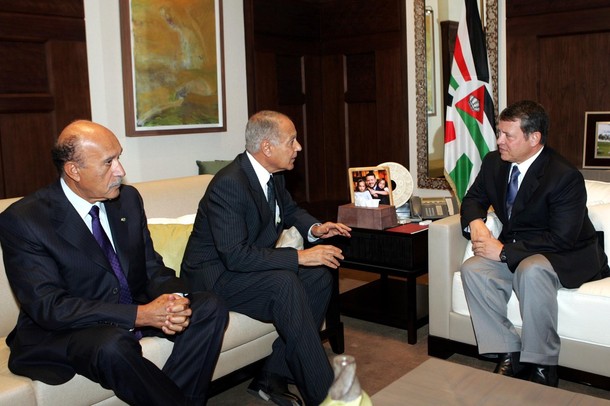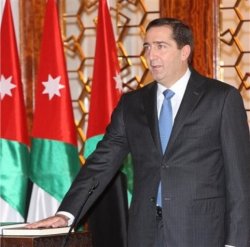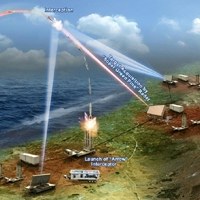![]()
Thu, Oct 28, 2010

File: Jordan's King Abdullah (R) meets Egyptian Foreign Minister Ahmed Aboul Gheit (C) and Egypt's intelligence chief Omar Suleiman (L) at the Royal Palace in Amman on October 5, 2009. (Photo: KHALIL MAZRAAWI/AFP/Getty Images)
Jordan’s King: Tensions, Conflicts and Violence Will Continue If Peace Talks Fail
King Abdullah II of Jordan on Thursday urged intensified international efforts to make progress in resolving the Palestinian-Israeli conflict, the state-run Petra news agency reported. At a meeting with Egyptian Foreign Minister Ahmad Abu El Gheit and Egyptian intelligence chief Omar Suleiman in Amman Thursday, the Jordanian leader warned that the region will remain subject to tensions, conflicts and violence if efforts to attain peace fail. Abdullah II said creating suitable environment to resume direct Palestinian-Israeli peace talks requires halting all unilateral and provocative measures, especially the settlement activities. The Jordanian leader stressed that coordination and cooperation between Jordan and Egypt will continue to develop a unified position to enhance joint Arab action in facing the different challenges. [XinhuaNewsAgency, Oct 28, 2010]
King Abdullah of Jordan also criticized Israel last April, and warned that the status of Jerusalem could blow up into another war. He also stated that Jordan was better off economically before it made peace with Israel in 1994, and said that Jordan’s relationship with Israel “is at an all-bottom low. It hasn’t been as bad as it is today and as tense as it is today.” Several months later, Abdullah and Prime Minister Binyamin Netanyahu conducted a meeting which Netanyahu described as “very positive”. The two leaders discussed peace in the region, and even discussed ways for Israel and Jordan to cooperate in the fields of economy, energy, and transportation. [Arutz Sheva, Oct 28, 2010]
Earlier this week, Jordanian Prime Minister Samir Rifai said that if serious efforts to resolve the Palestinian issue take place, the problems of terrorism and extremism will end, the state-run Petra news agency reported. In a lecture at the Royal Jordanian National Defense College (RJNDC) Tuesday, Rifai said Israel’s refusal to accept “a fundamental political solution to the Palestinian issue” means more conflicts and tensions and “lost hopes” to resolve the conflicts in the region. Rifai said as long as the Palestinian issue maintains the status quo, more problems, such as terrorism and extremism, will be created and affect societies. [Arutz Sheva, XinhuaNewsAgency, Oct 28, 2010]
“The Jordanian leadership believes that a just and comprehensive solution to the Palestinian issue is key to settling conflicts and problems in the region and the whole world,” said Rifai. He added that Jordan supports any efforts that will lead to the creation of an independent and viable Palestinian state.
In the meantime, dozens of Jordanians on Tuesday staged sit-ins near the Israeli embassy in Amman, calling for annulling the peace treaty with Israel. During the sit-in, which took place near Al Kaluti Mosque, demonstrators called for expelling the Israeli ambassador and urged people to boycott Israeli products. “The Wadi Araba Peace treaty represents a recognition of Israel, ” Secretary General of the Islamic Action Front (IAF) Hamzah Mansour said during the demonstration organized by the Jordanian Higher Executive Committee for Defending the Homeland and Confronting Normalization. The participants, including activists and members of professional associations in Jordan as well as political parties’ representatives, called for boycotting Israel products and supporting the Palestinians in the face of “racist policies exercised by the Israeli enemy.” [XinhuaNewsAgency, Oct 28, 2010]
Jordan signed a peace treaty with Israel in 1994. Known as the Wadi Araba peace treaty, it saw Jordan recognizing international borders but without prejudice to the status of areas restored to Israel in the Six Day War in 1967. Protests in Jordan against Israel are not a new phenomenon. In August, a group of Jordanian Islamists staged a sit-in and burned an Israeli flag in front of Jordan’s Tourism Ministry in Amman, to protest Jordanian tourism to Jerusalem and the need for a visa travel there. That protest was organized by the Jordanian Higher Executive Committee for Defending the Homeland and Confronting Normalization. The group is associated with the Islamic Action Front (IAF), a group linked to the pan-Arab Muslim Brotherhood. IAF was also behind this week’s protest. “Accepting the Wadi Araba Treaty is a considered recognition of the Zionist entity and a formal withdrawal of the central cause of the Arabs [the Palestinian cause],” said Secretary General of the Islamic Action Front (IAF) Hamzah Mansour during the protest. [Arutz Sheva, Oct 28, 2010]



 RSS
RSS











Jordan’s King: Tensions, Conflicts and Violence Will Continue If Peace Talks Fail | #Israel #Jordan #Egypt #PA #Peace http://j.mp/bpEvMd
RT @CrethiPlethi: Jordan’s King: Tensions, Conflicts and Violence Will Continue If Peace Talks Fail | #Israel #Jordan #Egypt #PA #Peace http://j.mp/bpEvMd